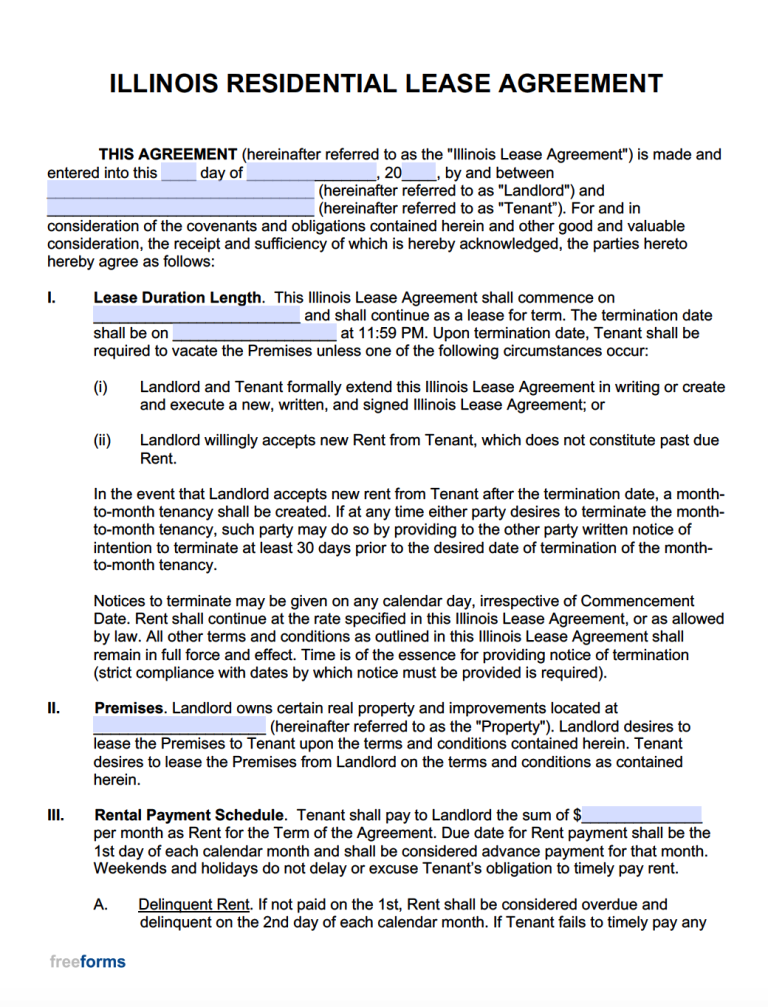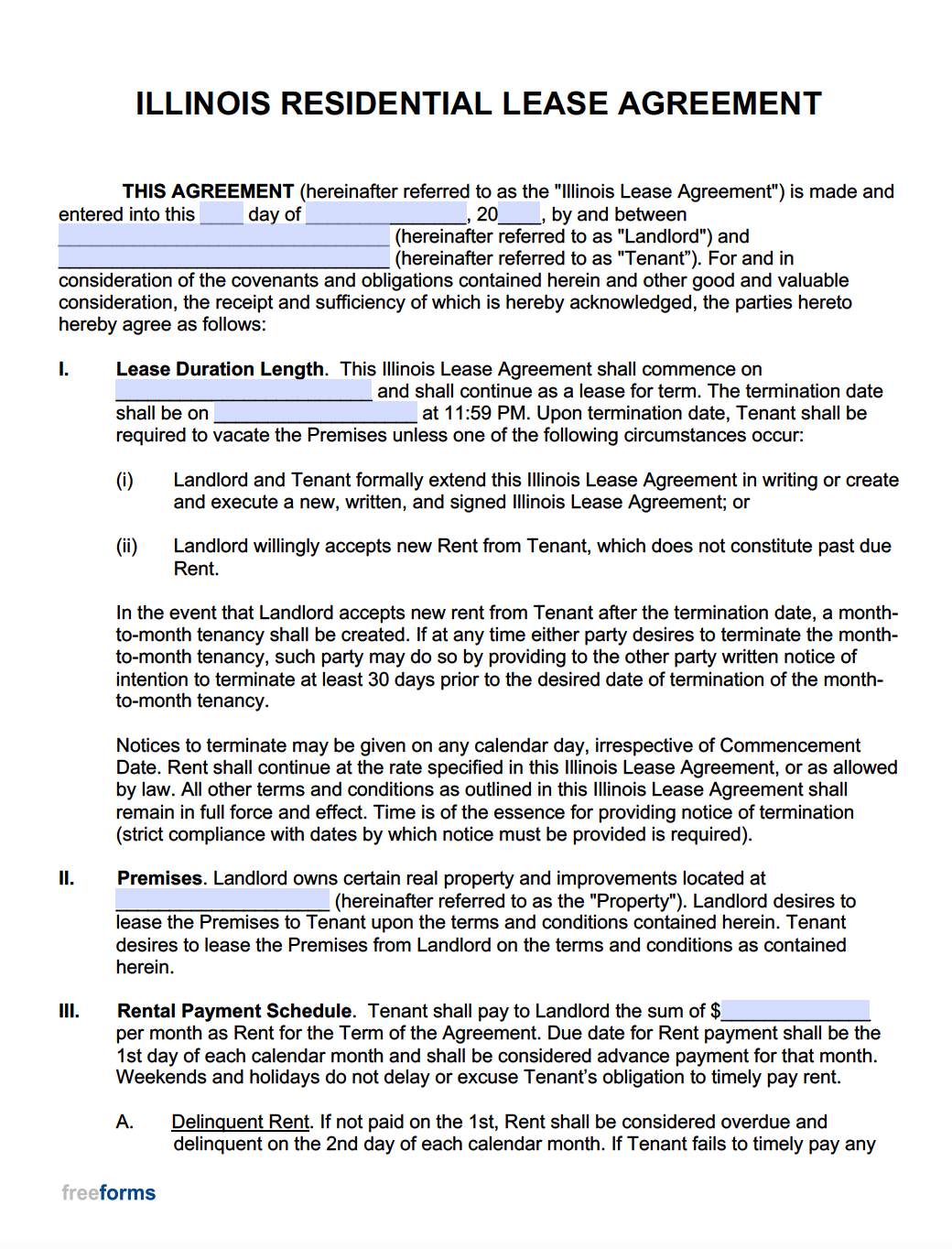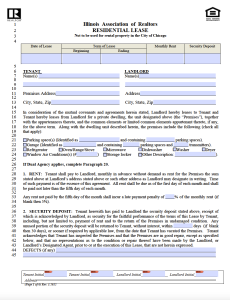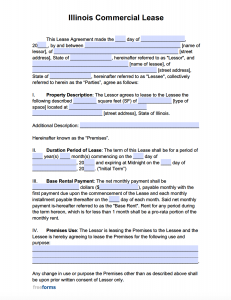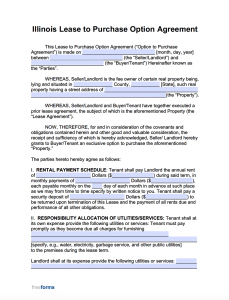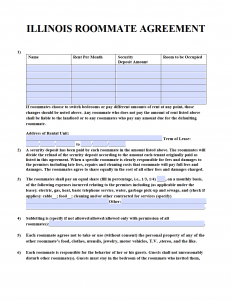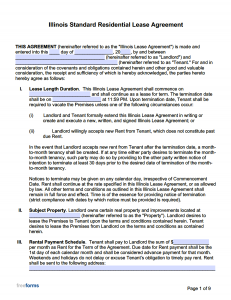Lease Agreements (6)
|
Download: PDF |
|
Download: PDF, Word (.docx) |
|
Download: PDF, Word (.docx) |
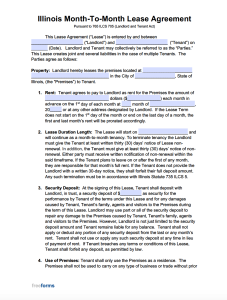 Month-to-Month Lease: Can be ended at any point in time on the condition that thirty (30) days’ notice is supplied by the terminating party (735 ILCS 5/9-207(b)). Month-to-Month Lease: Can be ended at any point in time on the condition that thirty (30) days’ notice is supplied by the terminating party (735 ILCS 5/9-207(b)).
Download: PDF, Word (.docx) |
|
Download: PDF |
|
Download: PDF, Word (.docx) |
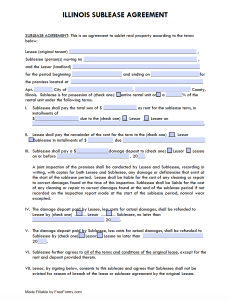 Sublease Agreement: Functions as a secondary agreement when a current tenant re-rents the property to a sub-tenant as per the master lease. Sublease Agreement: Functions as a secondary agreement when a current tenant re-rents the property to a sub-tenant as per the master lease.
Download: PDF, Word (.docx) |
Required Landlord Disclosures
1.) Carbon Monoxide (430 ILCS § 135/10(c)): Illinois landlords inform tenants (in writing) of all carbon monoxide detector maintenance procedures.
2.) Lead-Based Paint(42 U.S. Code § 4852d): All landlords looking to rent a residential property that was assembled before 1978 must first present a lead disclosure.
3.) Radon (420 ILCS § 46/25) – Under Chapter 420 (Nuclear Safety) and the Illinois Radon Awareness Act, landlords disclose any known information relating to the presence of radon on the property.
4.) Rent Concession (765 ILCS § 730): A “rent concession” is an incentive to entice prospective tenants.
5.) Smoke Detector (425 ILCS § 60/3(d)): Landlords must supply tenants with a written disclosure policy on smoke detector service.
6.) Utility Payment (765 ILCS § 740): Apartment and condo landlords where tenants share utilities must disclose the breakdown of expenses.
When is Rent Due?
Grace Period: Illinois does not generally regulate grace periods; however, it explicitly requires a 5-day grace period for mobile home communities. (770 ILCS 95/7.10)
Unpaid Rent: Landlords issue a 5-day notice requiring full rent payment before initiating further actions (735 ILCS 5/9-209).
Late Fees
Landlords use the lease impose a reasonable non-punitive late fee for missed payments accordingly (IL AG Rights and Laws).
Mobile Homes: Illinois explicitly allows the greater of “20 dollar or 20% late fee…for each month an occupant does not pay rent” (770 ILCS 95/7.10)
NSF Fee
Security Deposit Maximum ($)
Security Deposit Return($)
Returning to Tenant:The Illinois Security Deposit Act explicitly requires landlords deliver a tenant’s security deposit (and interest) within 45 days of lease termination (Security Deposit Return Act).
Itemized List: Landlords can deduct from the security to restore the premises, but must supply an itemized list of each expense (Security Deposit Return Act).
Landlord’s Right to Enter
Standard Entry: Illinois specifically forbids landlords from entering by force unless by court order or required by law (735 ILCS 5/Art).
Emergency Entry: While Illinois does not explicitly permit entry during an emergency, some ordinances, such as those in Chicago and Cook County, allow emergency entry (Chicago Mun. Code § 5-12-050).
Absence
Repair and Deduct
Tenant Breaking a Lease (Early)
Duty To Mitigate: Illinois specifically states that landlords must take “reasonable efforts” to lower the cost of the damages resulting from a tenant’s early lease termination (735 ILCS 5/9-213.1).
Domestic Violence: Landlords must accept a tenant’s 3-day notice of termination whenever the reason is domestic or sexual violence (765 ILCS 750/15).
Active Military: Military service members may terminate their lease to report to duty or honor reassignment (50 USC § 3955).
Landlord Noncompliance: Landlords may not interrupt utilities, violate health and safety codes, or retaliate against tenants (765 ILCS 735/1.4.; 765 ILCS 735/0.01).
Landlord Harassment: In addition to prohibiting landlords from inappropriately terminating a tenant’s utilities, tenants:
- Enjoy protections from landlord retaliation
- Are eligible for rent abatement in cases of illegal utility interruptions
- Requires landlords enter only peaceably (765 ILCS 720/1)(765 ILCS 735/2.1)(765 ILCS 735).
